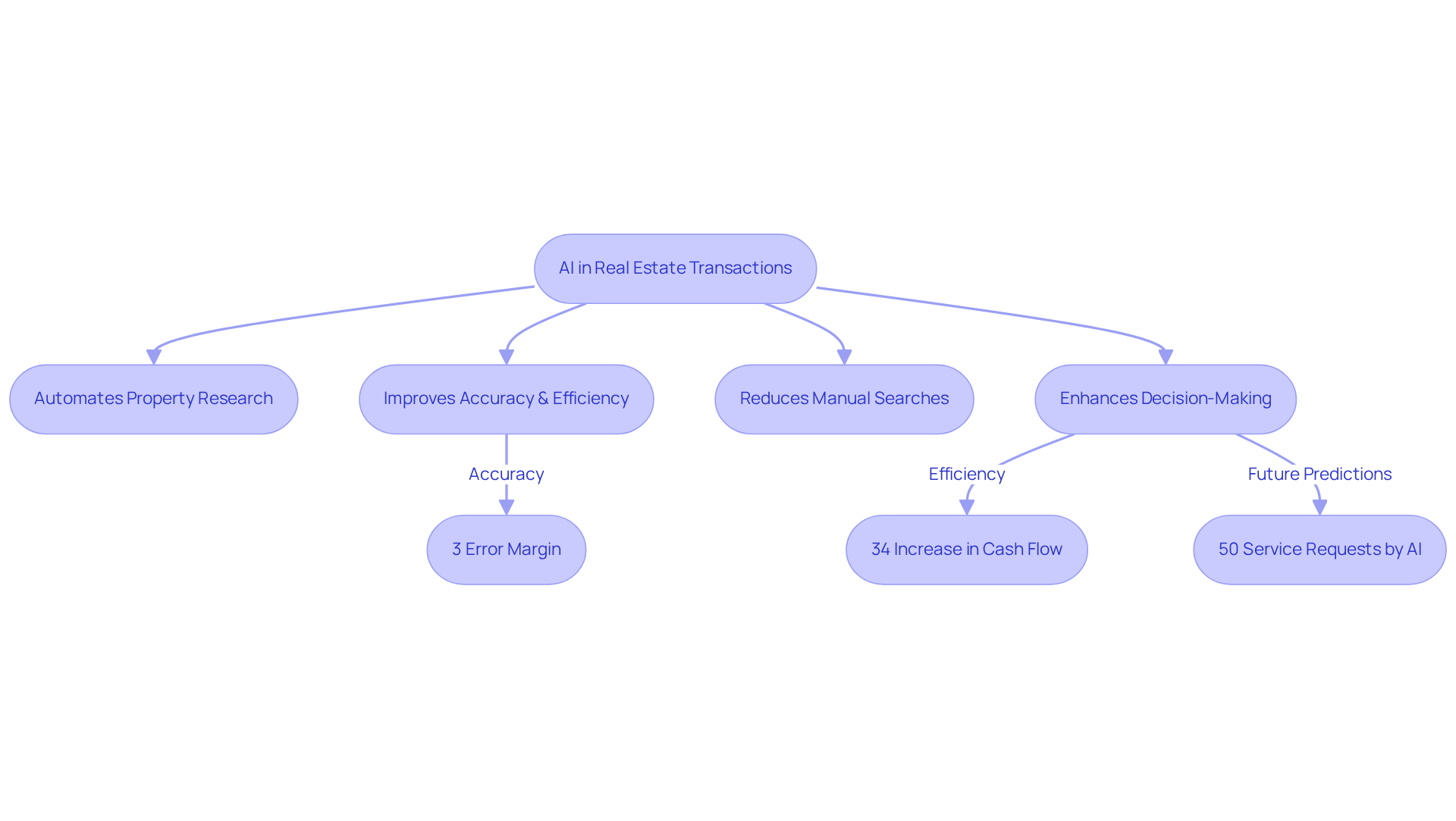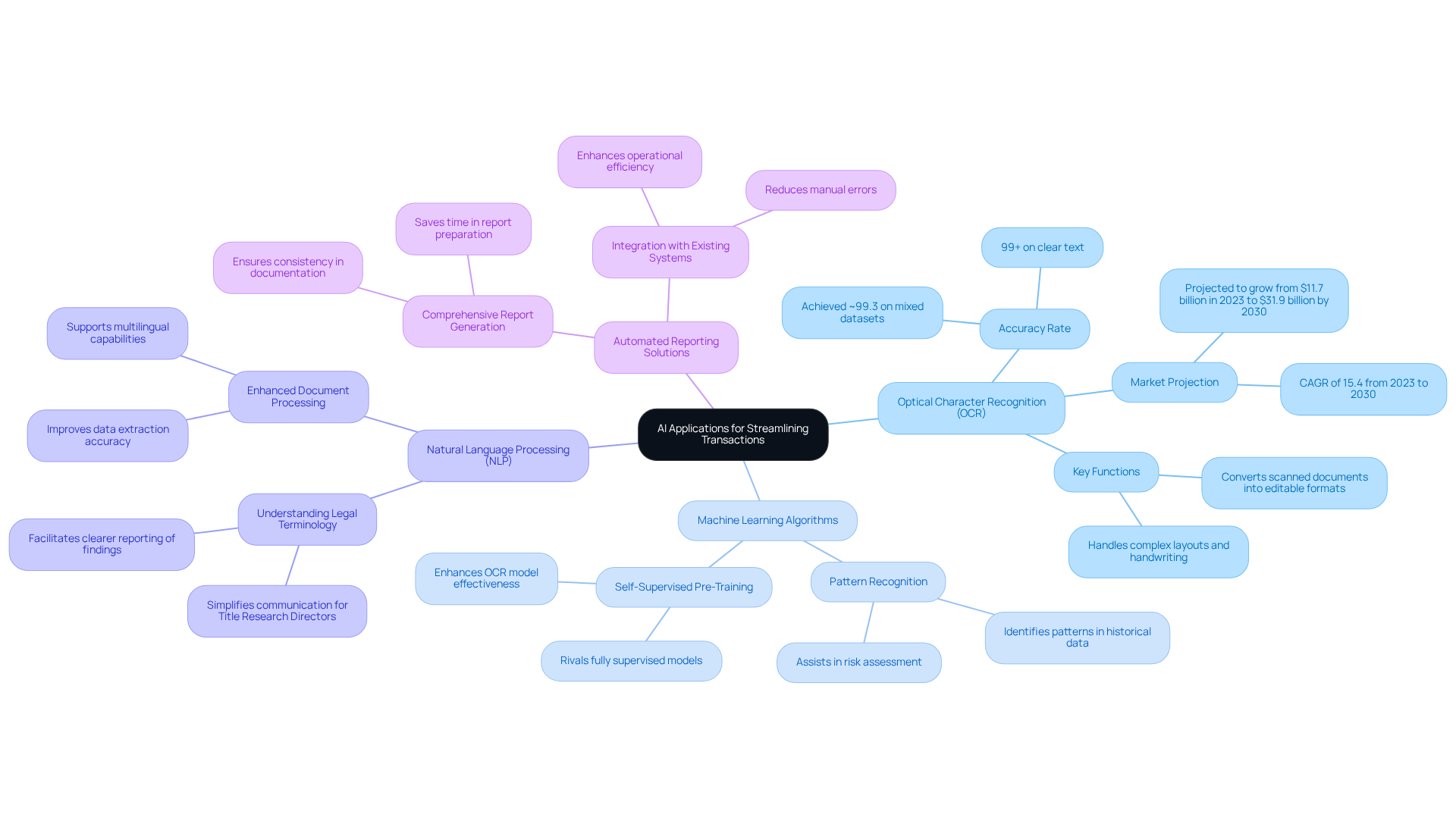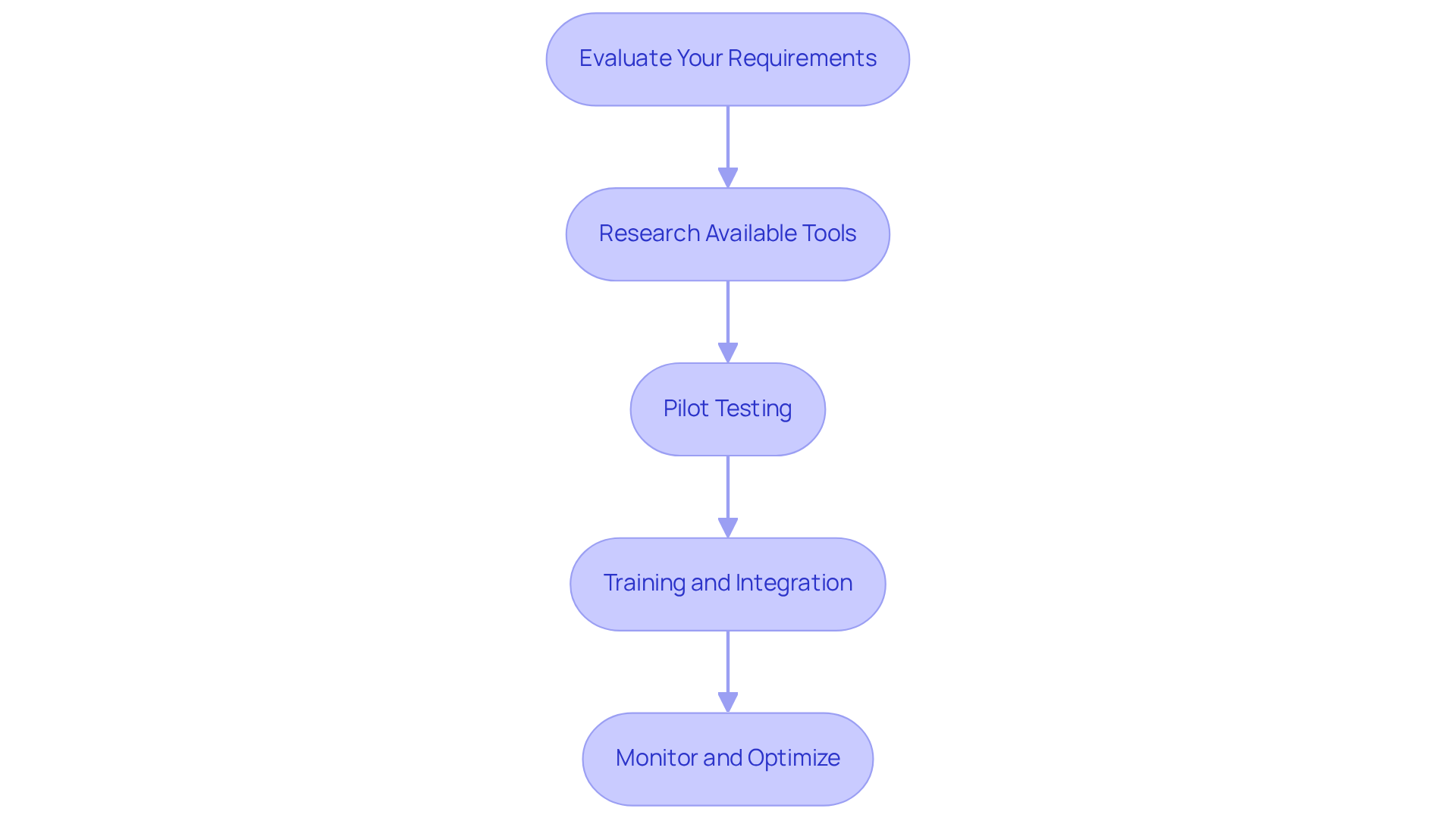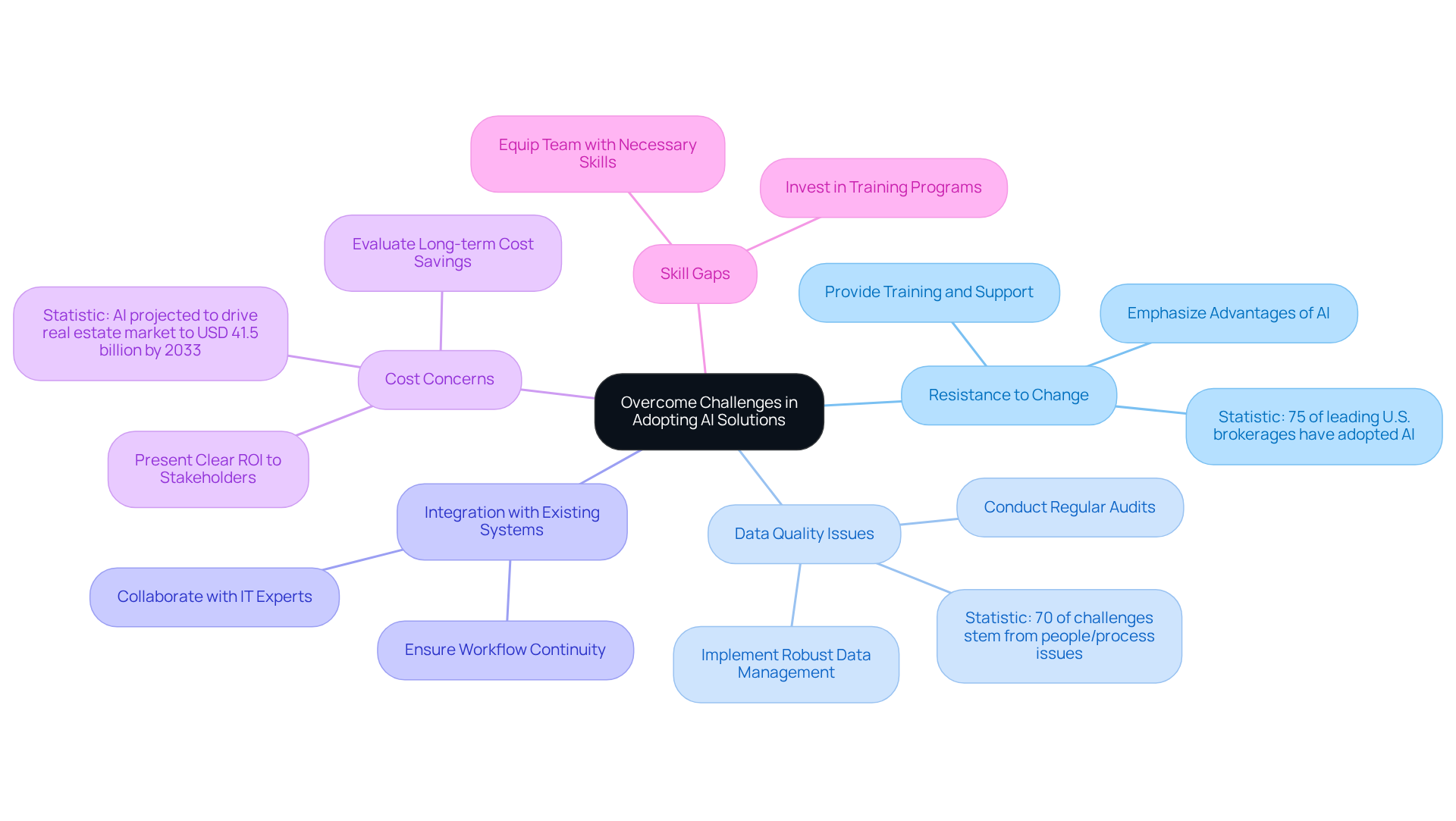Overview
AI accelerates real estate transactions for Title Research Directors by automating property research processes, enhancing accuracy, and significantly reducing the time spent on manual tasks. The significance of accurate title research cannot be overstated, as it directly impacts decision-making and operational efficiency.
However, Title Research Directors often face challenges due to the labor-intensive nature of traditional methods. Technologies such as:
- Optical Character Recognition (OCR)
- Machine learning algorithms
emerge as powerful solutions, streamlining workflows and improving precision. Consequently, these advancements allow Title Research Directors to focus more on strategic decision-making rather than administrative burdens, ultimately driving better outcomes for their organizations.
Introduction
AI is fundamentally reshaping the landscape of real estate transactions, delivering unprecedented speed and accuracy in title research processes. By automating complex document analysis and significantly reducing the risk of human error, AI empowers Title Research Directors to concentrate on strategic decision-making rather than tedious administrative tasks.
However, as the industry embraces these advanced technologies, questions arise:
- What challenges must be overcome to fully leverage AI's potential?
- How can organizations ensure a seamless integration into their existing workflows?
Understand the Role of AI in Real Estate Transactions
AI is revolutionizing real estate transactions, showcasing how AI speeds up real estate transactions by automating and enhancing property research processes. This technology swiftly analyzes extensive collections of document records, significantly improving accuracy and efficiency. By identifying discrepancies and extracting critical information with remarkable speed, AI reduces the time spent on manual searches and minimizes human error. Consequently, Title Research Directors can focus on strategic decision-making rather than administrative tasks. Notably, AI-driven platforms enhance precision in document analysis, providing estimates with merely a 3% error margin, ensuring compliance with legal standards and elevating the overall quality of analysis.
Furthermore, industry leaders acknowledge the potential of AI. Ronald Kamdem highlights that automation could lead to a 34% increase in operating cash flow for brokers and services. As a result, leveraging AI demonstrates how AI speeds up real estate transactions by streamlining workflows, making them faster and more reliable. Predictions indicate that by 2030, 50% of all service requests will be initiated by machine customers powered by agentic AI systems. This underscores the in the industry.

Explore Key AI Applications for Streamlining Transactions
AI applications are revolutionizing real estate transactions, demonstrating how AI speeds up real estate transactions, particularly in property research. The significance of accurate title research cannot be overstated, as it lays the foundation for informed decision-making. However, challenges persist in processing vast amounts of data efficiently. Key technologies addressing these challenges include:
- Optical Character Recognition (OCR): This technology effectively converts scanned documents into editable and searchable formats, facilitating quick retrieval of information from document titles. With achieving over 99% accuracy on clear text, the reliability of data extraction has markedly improved. The OCR market is projected to grow from $11.7 billion in 2023 to $31.9 billion by 2030, underscoring its critical role in the industry.
- Machine Learning Algorithms: These algorithms utilize historical data to identify patterns and predict outcomes, assisting in risk assessment related to property ownership. Notably, self-supervised pre-training techniques have rendered OCR models "very effective" when fine-tuned, rivaling fully supervised models and enhancing their capacity to recognize diverse fonts and layouts.
- Natural Language Processing (NLP): NLP resources facilitate the understanding of intricate legal terminology present in title documents, thereby simplifying communication for Title Research Directors. This capability is essential, as it allows for a clearer understanding and reporting of findings.
- Automated Reporting Solutions: These solutions generate comprehensive reports from extracted data, ensuring consistency and conserving valuable time in documentation processes. The integration of such tools not only boosts operational efficiency but also mitigates the likelihood of manual errors. For instance, the launch of the ABBYY Document AI API significantly enhances automated document workflows, demonstrating the practical utility of these tools.
By embracing advanced technologies, Title Research Directors can leverage how AI speeds up real estate transactions to substantially improve their workflow, ensuring quicker and more accurate management of ownership investigations. As John K. Waters, editor in chief, observed, "Organizations embracing AI-powered OCR gain a strategic edge by making unstructured data more accessible and actionable.

Implement AI Tools for Efficient Title Research
To effectively implement AI tools for title research, follow these essential steps:
- Evaluate Your Requirements: Start by pinpointing particular difficulties within your existing document examination process that AI might assist in addressing. This could encompass inefficiencies in data extraction or challenges in handling extensive volumes of document files.
- Research Available Tools: Investigate various AI solutions tailored for title research. Focus on features that align with your identified needs, such as machine learning capabilities for variance analysis or optical character recognition for document processing.
- Pilot Testing: Choose a select few resources and conduct pilot tests to evaluate their effectiveness in your workflow. Successful case studies indicate that organizations that engage in pilot testing often see a 30% increase in operational efficiency.
- Training and Integration: Provide for your team on the chosen AI resources for effective utilization. Seamless integration with existing systems is crucial to avoid disruptions and enhance user adoption.
- Monitor and Optimize: Continuously observe the performance of the AI systems and gather feedback from your team. This iterative process enables continuous enhancement, ensuring that the resources develop to accommodate evolving requirements and increase precision.
By following these steps, Title Research Directors can successfully integrate AI resources to understand how AI speeds up real estate transactions, greatly improving efficiency and precision in their workflows. Significantly, as of 2025, 78% of organizations are utilizing AI in at least one business function, emphasizing the urgency of embracing these innovations. Furthermore, 85% of executives believe that effective AI implementation will help maintain a competitive advantage.

Overcome Challenges in Adopting AI Solutions
Adopting AI solutions presents several challenges, yet these can be effectively overcome with the right strategies.
- Resistance to Change: To foster a culture of innovation, it is essential to emphasize the . Providing training and support will ease the transition. According to the 2024 New Delta Media Survey, 75% of leading U.S. brokerages have adopted AI technologies, showcasing the industry's significant shift towards innovation.
- Data Quality Issues: Ensuring that the data fed into AI systems is accurate and up-to-date is crucial. Conducting regular audits of your data sources is necessary. Notably, 70% of challenges in implementing AI initiatives stem from people- and process-related issues, underscoring the importance of robust data quality management.
- Integration with Existing Systems: Close collaboration with IT experts is vital to ensure that new AI solutions seamlessly merge with current systems. This collaboration is essential for maintaining workflow continuity during the transition.
- Cost Concerns: It is important to evaluate the long-term cost savings associated with AI adoption in comparison to the initial investment. AI is projected to drive the real estate market to reach USD 41.5 billion by 2033, making a compelling case for its adoption. Presenting a clear ROI to stakeholders is necessary to justify the investment.
- Skill Gaps: Investing in training programs to equip your team with the necessary skills to utilize AI tools effectively is imperative. Addressing skill gaps is vital for maximizing the benefits of AI technologies.
By proactively addressing these challenges, Title Research Directors can facilitate a successful transition to AI-enhanced title research processes, showcasing how AI speeds up real estate transactions by improving efficiency and accuracy.

Conclusion
AI is fundamentally transforming the landscape of real estate transactions, particularly for Title Research Directors. By automating and enhancing property research processes, AI accelerates transaction speeds and elevates accuracy and compliance in document analysis. This shift empowers professionals to prioritize strategic decision-making over tedious administrative tasks, ultimately reshaping the industry's efficiency.
Throughout this guide, we have explored several key applications of AI, including:
- Optical Character Recognition
- Machine Learning Algorithms
- Natural Language Processing
- Automated Reporting Solutions
Each technology plays a crucial role in streamlining workflows, addressing challenges in data processing, and ensuring that Title Research Directors can manage ownership investigations with greater speed and precision. The implementation of AI tools promises significant operational improvements, as evidenced by the projected growth of AI in the real estate sector and the increasing reliance on these innovations.
Embracing AI is not merely an option; it is becoming a necessity for maintaining a competitive edge in the real estate market. As the industry evolves, Title Research Directors are encouraged to proactively adopt AI solutions and overcome associated challenges. By investing in training, ensuring data quality, and integrating these technologies into existing systems, professionals can leverage AI to revolutionize their workflows. The future of real estate transactions lies in the hands of those who harness the power of AI—transforming the way business is conducted and setting new standards for efficiency and accuracy.
Frequently Asked Questions
How is AI impacting real estate transactions?
AI is revolutionizing real estate transactions by automating and enhancing property research processes, leading to faster and more efficient transactions.
What are the benefits of using AI in property research?
AI swiftly analyzes extensive document records, improving accuracy and efficiency, identifying discrepancies, and extracting critical information quickly, which reduces manual search time and minimizes human error.
How does AI affect the role of Title Research Directors?
AI allows Title Research Directors to focus on strategic decision-making rather than administrative tasks, as it automates many of the routine aspects of document analysis.
What is the error margin associated with AI-driven document analysis?
AI-driven platforms provide estimates with a mere 3% error margin, ensuring compliance with legal standards and enhancing the overall quality of analysis.
What potential financial impact does AI have on real estate brokers and services?
Automation through AI could lead to a 34% increase in operating cash flow for brokers and services, according to industry leaders.
What predictions are made about AI's role in service requests by 2030?
Predictions indicate that by 2030, 50% of all service requests will be initiated by machine customers powered by agentic AI systems, highlighting the growing reliance on AI in the industry.




